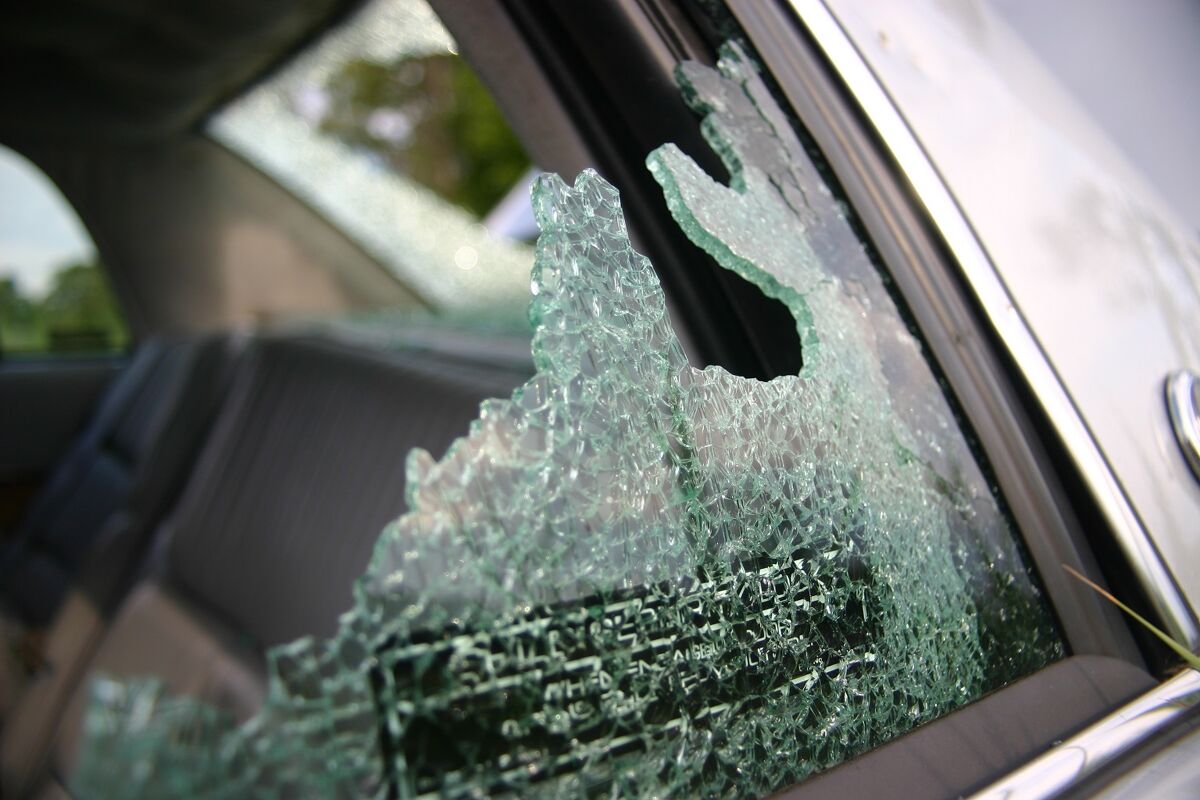Theft
According to NFU Mutual's 2024 Rural Crime Report, the cost of rural crime increased by 4.3% in 2023, reaching £52.8 million.
Valuable farming equipment is being stolen to meet increased overseas demand, with criminals now specifically targeting tractor GPS technology, which costs around £10,000.
Farms are not just businesses, they are family homes. Not only does rural theft have huge financial repercussions for those who rely on livestock and machinery for their livelihood, but it can leave rural communities feeling vulnerable and fearful for personal safety, with one in ten rural residents telling the most recent National Rural Crime Network Survey that they feel unsafe in their own home after dark.
Got information on rural theft? Tell us what you know and remain 100% anonymous – guaranteed. Fill in our online form or call 0800 555 111:

If you have information about a crime, use the free what3words app to report the exact location of the incident.
You can either copy and paste the three words into our rural crime form, or call 0800 555 111 and share them with one of our Call Agents when you are giving information anonymously.
In an emergency, always call 999 - you can also use what3words to tell the police operator exactly where to send help.
Learn more about the types of thefts which affect rural communities:
including theft of farm equipment, vehicles and machinery, livestock theft, cable theft, ATM theft , equine crime and fuel theft.
Combined agricultural vehicle theft including quad bikes and ATVs rose by 29% to £11.7m in 2022, according to NFU Mutual’s 2023 Rural Crime Report, as organised criminal gangs cashed in on the rising cost and limited supply of vehicles and machinery.
Criminals are now specifically targeting tractor GPS technology, to meet increased overseas demand.
- Unusual or suspicious vehicles parked nearby or travelling in the area. Try to record the registration numbers and descriptions of any such vehicles.
- Strangers calling and asking for directions – these could be criminals assessing levels of farm security, identifying machinery to steal, and establishing what vehicles they’ll need to transport them away.
- In an emergency, always call 999 - otherwise call the police on 101.
- If you wish to remain anonymous, tell us what you know about suspected criminals by calling 0800 555 111 or use our online form.
- If you’ve been a victim of theft and you’re looking for further support, contact Victim Support.
- When vehicles are not in use, lock them up securely and remove the keys.
- Install tracking devices to quad bikes and tractors and consider ‘geo fencing’ technology to alert you if your vehicles are driven off your land.
- Quads and ATVs can be an easy target due to their lack of registration plates –you can combat this with CESAR vehicle marking.
- Some farmers in Wales are now utilising bodycam technology to combat rural crime.
- Further prevention advice from the National Farmers Union.
NFU Mutual’s 2023 Rural Crime Report estimated that £2.7m-worth of farm animals were stolen from UK farms last year, making rustling one of the costliest crimes for the UK’s farmers.
The rising price of food makes rustling a more lucrative crime for criminal gangs.
- Signs that fences have been breached or that an unknown person is in or near the field with your livestock.
- In an emergency, always call 999 - otherwise call the police on 101.
- If you wish to remain anonymous, tell us what you know about suspected criminals by calling 0800 555 111 or use our online form.
- If you’ve been a victim of theft and you’re looking for further support contact Victim Support.
- Padlock all gates and consider installing gate/fence alarms.
- Clearly mark your stock and consider using a TecTRACER or similar system to do this, as the thousands of forensic coded microdots marked are virtually impossible to remove.
- Ensure you keep up-to-date records of your stock.
- Graze livestock away from roads if possible.
- Further advice from the National Farmers Union.
Equine crime causes immense emotional distress and financial damage to horse owners.
- Strangers on your yard or in your fields. Remember the description of any such strangers, and write it down as soon as possible.
- Any gaps in fencing or hedges.
- Loosened bolts and hinges on gates.
- Markers such as plastic bags tied to fences or marks on the road – these could indicate to thieves that there is an item on the other side of the fence awaiting collection.
- Click or tap here for useful information from UK Horsewatch Alliance, including known tactics of horse thieves, and what to do if you are a victim of theft.
- In an emergency, always call 999 - otherwise call the police on 101.
- If you wish to remain anonymous, tell us what you know about suspected criminals by calling 0800 555 111 or use our online form.
- If you’ve been a victim of theft and you’re looking for further support, contact Victim Support.
- Store tack in a strong brick or concrete structure secured with a five-lever mortice lock, fitting metal bars across any windows.
- Tag your tack and lock equipment such as saddles to racks.
- Ensure horses are microchipped and hoof/freeze marked to aid identification if found, and keep your horse passport up-to-date with any markings recorded.
- Secure your yard by chaining gates closed and consider installing alarms or CCTV around stables.
- Further advice from the police.
ATM theft is not a ‘victimless crime’; businesses may be forced to close for months as criminals often demolish shop fronts to break out the cash, and they may even steal local farm machinery to do so.
Elderly and vulnerable people in our rural communities are disproportionately affected as they are less likely to be able to travel elsewhere to access cash, with raided ATMs taking up to 4.5 months to be replaced. For these people, ATMs are a vital provider of banking services and act as a lifeline for rural communities.
- Suspicious activity such as heavy plant vehicles being driven on rural roads late at night.
- In an emergency, always call 999 - otherwise call the police on 101.
- If you wish to remain anonymous, tell us what you know about suspected criminals by calling 0800 555 111 or use our online form.
- If you’ve been a victim of theft and you’re looking for further support, contact Victim Support.
- Businesses should consider installing CCTV to monitor activity around cash machines.
- Cash machines can be strategically placed to make them more difficult to target, e.g. ensuring they are not visible from the street.
Not only is cable theft incredibly dangerous due to the risk of electrocution, but it can cause a loss of connectivity, power cuts, destruction to farmland if cables are dragged across fields, and damage to electrical appliances.
For example, in December 2020, members of an organised crime gang were jailed for stripping 92 km of electric power lines for the copper wiring, leaving 45,000 rural homes without power.
Cable theft also causes huge disruption to our rail networks, with 26 railway metal theft incidents in Network Rail’s North West & Central region between October 2018 and October 2020 costing the taxpayer £1.7 million and delaying passengers by 18,359 minutes.
- Suspicious activity, suspicious persons or suspicious unbranded vehicles around electricity substations, underground footway / carriageway boxes and overhead power lines.
- People working on the power lines without high visibility, branded safety clothing.
- People loading cable into vehicles.
- Activity around power lines during the night or early hours of the morning.
- A broken or fallen down power line.
- An open door at a substation.
- Any unsafe work around access to footway / carriageway boxes could be a sign of criminal activity- for example using vehicles to pull cable out of boxes / poor or no road works guarding / the use of power tools to cut cable/operatives not wearing safety gear or uniforms and working during the hours of darkness.
- Open footway / carriageway boxes left unattended or without gate guards surrounding them
- Footway or carriageway covers/lids removed or missing
- Drag marks through soft ground crops or fields
- Evidence that unauthorised vehicles have driven off-road / fields (damaged fences, gates or access routes)
- Cable sheathing near underground boxes or in fields (could mean thieves have dragged cable into an area of cover to remove the sheathing)
- Challenge operatives if it’s safe to do so, all authorised employees and contractors working in the network carry photo ID
- Check perimeter fences/hedges/gate regularly – these will often be damaged in preparation for cable to be dragged.
- Did you know: Openreach use forensic marking and assets tagging to help reduce attacks on their network and further protect their footway and carriageway boxes by locking them using plant protection in areas of known cable theft. Learn more about what Openreach are doing to secure their network.
- If you witness a theft in progress, call the police on 999 - otherwise call the police on 101.
- If you wish to remain anonymous, tell us what you know about suspected criminals by calling 0800 555 111 or use our online form.
- You can tell us registration numbers and descriptions of suspicious vehicles.
- Be sure to keep a safe distance from any seemingly broken equipment or anyone behaving suspiciously.
- Do not touch or go close to any exposed cables, enter open substations or attempt to move dangling cables as they may still be live and, therefore, extremely dangerous.
- Ensure children, pets and livestock are kept away from any damaged or exposed electrical equipment.
49% of farmers say that fuel theft is the rural crime they are most concerned about. It causes acute financial pressure, as fuel tanks can cost thousands of pounds to refill.
- Inspect your fuel tank regularly to check the oil level, and look for marks on the locks and spilt fuel which could indicate theft/attempted theft.
- In an emergency, always call 999 - otherwise call the police on 101.
- If you wish to remain anonymous, tell us what you know about suspected criminals by calling 0800 555 111 or use our online form.
- If you’ve been a victim of theft and you’re looking for further support, contact Victim Support.
- Invest in high-quality locks, locking fuel caps and anti-siphoning deterrents, as organised criminals are likely to come equipped to cut through basic locks.
- Install motion-activated lighting around the fuel tank to deter criminals who rely on darkness to go undetected.
- Consider investing in CCTV or burglar alarms.
- Check tank fuel levels regularly and keep receipts from the latest delivery to aid identification.
- Useful advice from the Countryside Alliance.

Give information
Give information anonymously by phone on 0800 555 111 or online

Donate to us
Join our fight against crime by making us a donation today, and see how the money you give can help shape your community for the better.

Fearless - our youth service
Find out about Fearless, Crimestoppers' youth service for 11-17 year olds.
